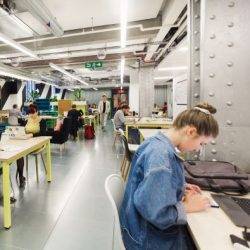July 11, 2017
Taylor Review on Modern Working Practices and the gig economy is published 0
 The long awaited UK government commissioned report into modern working practices and the so-called gig economy has been published at last. The Taylor Review was commissioned by the Department for Business, Energy & Industrial Strategy last year and there has been a great deal of speculation regarding its content ever since, especially last week after parts were apparently leaked to the media. You can follow the pile in now on Twitter and the festering pits of ignorance, prejudice and bile known as newspaper comment sections. Or you can read it here before you draw your own conclusions. We’ll be having our say tomorrow and sharing the thoughts of various organisations into its contents. The report was authored by Matthew Taylor, Chief Executive of the RSA and considers the implications of new forms of working, especially with regard to the gig economy and freelance work on worker rights and responsibilities, as well as on employer freedoms and obligations. It sets out seven key principles to address the challenges facing the UK labour market, set out below.
The long awaited UK government commissioned report into modern working practices and the so-called gig economy has been published at last. The Taylor Review was commissioned by the Department for Business, Energy & Industrial Strategy last year and there has been a great deal of speculation regarding its content ever since, especially last week after parts were apparently leaked to the media. You can follow the pile in now on Twitter and the festering pits of ignorance, prejudice and bile known as newspaper comment sections. Or you can read it here before you draw your own conclusions. We’ll be having our say tomorrow and sharing the thoughts of various organisations into its contents. The report was authored by Matthew Taylor, Chief Executive of the RSA and considers the implications of new forms of working, especially with regard to the gig economy and freelance work on worker rights and responsibilities, as well as on employer freedoms and obligations. It sets out seven key principles to address the challenges facing the UK labour market, set out below.












 Acas’ helpline receives many callers working on a zero hours, agency or self-employed arrangement who do so out of necessity rather than by choice, with some people feeling taken advantage of and unfairly excluded from employment rights. In its response to the Matthew Taylor review on modern employment practices the Acas Council looked at calls to its employment helpline, which revealed confusion and uncertainty around employment status and rights for those involved in the non-standard types of working. Prompted by evidence that these types of working arrangements are on the rise Acas has also published a new discussion paper on non-standard or ‘atypical’ forms of work, and identifies areas where good practice can be encouraged and improved. The discussion paper, Ain’t that typical? Everyday challenges for an atypical workforce, also reveals that the practice of ‘zeroing down’ workers’ hours is used in some workplaces to discourage staff from raising concerns or asserting rights.
Acas’ helpline receives many callers working on a zero hours, agency or self-employed arrangement who do so out of necessity rather than by choice, with some people feeling taken advantage of and unfairly excluded from employment rights. In its response to the Matthew Taylor review on modern employment practices the Acas Council looked at calls to its employment helpline, which revealed confusion and uncertainty around employment status and rights for those involved in the non-standard types of working. Prompted by evidence that these types of working arrangements are on the rise Acas has also published a new discussion paper on non-standard or ‘atypical’ forms of work, and identifies areas where good practice can be encouraged and improved. The discussion paper, Ain’t that typical? Everyday challenges for an atypical workforce, also reveals that the practice of ‘zeroing down’ workers’ hours is used in some workplaces to discourage staff from raising concerns or asserting rights.


 Britain’s most family friendly and flexible employers have been recognised in this year’s Top Employers for Working Families Awards. Now in their 8th year, the annual Top Employers for Working Families Special Awards from the UK’s work life balance charity cover 11 categories across a range of work life policies and practices. Four new sector-specific awards are being introduced this year for the private, public and third sectors; as well as a category for small employers. Sarah Jackson OBE, chief executive of Working Families, said: “In many ways, flexible working and family friendly working have never been more part of the bloodstream of British business. We had a record-breaking number of entries this year, showcasing a wealth of exciting approaches to creating agility in the workplace. Congratulations to all this year’s Top Employers for Working Families award winners, singled out because they offer leading flexible workplaces that support the grain of their employees’ lives. I look forward to working with them to make work work, for people, families and the economy, so that families thrive and business prospers.”
Britain’s most family friendly and flexible employers have been recognised in this year’s Top Employers for Working Families Awards. Now in their 8th year, the annual Top Employers for Working Families Special Awards from the UK’s work life balance charity cover 11 categories across a range of work life policies and practices. Four new sector-specific awards are being introduced this year for the private, public and third sectors; as well as a category for small employers. Sarah Jackson OBE, chief executive of Working Families, said: “In many ways, flexible working and family friendly working have never been more part of the bloodstream of British business. We had a record-breaking number of entries this year, showcasing a wealth of exciting approaches to creating agility in the workplace. Congratulations to all this year’s Top Employers for Working Families award winners, singled out because they offer leading flexible workplaces that support the grain of their employees’ lives. I look forward to working with them to make work work, for people, families and the economy, so that families thrive and business prospers.”








 A new survey claims that UK workers waste on average five days of annual leave each year with one in six having more than a full working week of holiday leftover in 2016. The new study, commissioned by Airtours, has found that 40 percent of workers did not use up their full holiday allowances, and those who did spent less than half of their time off relaxing. Of the reasons given for not taking their allocated leave, 25 percent of people asked said they didn’t need to take it or even want to, 36 percent had too much on at work to take time off, and 26 percent weren’t allowed to take holiday as it meant being off at the same time as colleagues. When people did take a break last year, the research suggests that most of the time people weren’t using their holiday how they should have been by recharging their batteries. On average people spent seven holiday days at home and 56 percent admitted to doing boring chores instead of getting out and enjoying themselves. A further 32 percent used their holiday to go to medical appointments and 17 percent used it to deal with those unexpected family emergencies, like illness or injury or taking the dog to the vet.
A new survey claims that UK workers waste on average five days of annual leave each year with one in six having more than a full working week of holiday leftover in 2016. The new study, commissioned by Airtours, has found that 40 percent of workers did not use up their full holiday allowances, and those who did spent less than half of their time off relaxing. Of the reasons given for not taking their allocated leave, 25 percent of people asked said they didn’t need to take it or even want to, 36 percent had too much on at work to take time off, and 26 percent weren’t allowed to take holiday as it meant being off at the same time as colleagues. When people did take a break last year, the research suggests that most of the time people weren’t using their holiday how they should have been by recharging their batteries. On average people spent seven holiday days at home and 56 percent admitted to doing boring chores instead of getting out and enjoying themselves. A further 32 percent used their holiday to go to medical appointments and 17 percent used it to deal with those unexpected family emergencies, like illness or injury or taking the dog to the vet. 













